Social research & deliberation
The team are currently running fascinating deliberative public dialogues, Citizens’ Juries and other in-depth deliberative programmes for a range of clients including the Nuffield Council on Bioethics (NCOB); the Nuffield Foundation; the Human Developmental Biology Initiative; the Department for Science, Innovation and Technology; the Ada Lovelace Institute and the Information Commissioner’s Office (ICO); the Natural Environment Research Council (NERC); the British Science Association and the Pandemic Ethics Accelerator.
Over the last two years HVM has run significant public dialogues for Genomics England, the UK National Screening Committee, the National Data Guardian and the National Food Strategy. Many of these programmes were co-funded and supported by Sciencewise and UK Research and Innovation.
Find out more about our recent work by scrolling through this page.
Citizens’ Jury exploring public views on assisted dying
Since 2023 HVM has been working with it’s partners M.E.L Research to deliver a public engagement project on assisted dying for the Nuffield Council on Bioethics. The programme has included the first Citizens’ Jury in England on the topic, as well as two nationally representative surveys.
30 Citizens’ Jury members were brought together using a stratified sampling method. This creates a ‘mini-public’ broadly representative of the English population. This way of recruiting Jury members is a civic lottery method called ‘sortition’ and was conducted by The Sortition Foundation.
The Citizens’ Jury, designed and facilitated by HVM, took place between April and June 2024. The Jury met for seven sessions, five of which took place online and two in person. In total, they spent 24 hours learning about, exploring and deliberating on the topic over an eight-week period. Additional time was also spent in between the Jury sessions reviewing materials, information and evidence provided.
An interim report describing what the Jury said in their own words was published in September 2024. An briefing document was published in November 2024. This is a qualitative analysis of why the Jury members made the recommendations they did. The final report giving detailed insights from the Citizens’ Jury on assisted dying, together with findings from the two nationally representative surveys. This presents the values and principles that underpin people’s thinking as they have explored the complex and sensitive topic of assisted dying in depth.
A National Conversation About Food for the Food, Farming & Countryside Commission
In August 2023 the Food, Farming & Countryside Commission published the findings from this important public dialogue about food. The dialogue involved a mini-public - groups of people in Cambridgeshire and Birmingham who worked together in June and July to share their views on potential policy interventions on the food system in the run up to a general election and beyond. The findings report shows that citizens are hungry for change. They call for urgent action to change the food system for the better - with more government intervention and less fear of change.
This dialogue was a proof of concept phase, for a much larger UK dialogue to run from the winter of 2023 onwards. It’s purpose? To help shift the public narrative around food by amplifying citizen voices on food systems and potential policy interventions.
NERC: Contemporary Issues In Environmental Science
This year HVM has begun work with the Natural Environment Research Council (NERC) on a new public dialogue to explore contemporary issues in environmental science. The project will run from the end of 2022 through to the beginning of 2023.
The public dialogue will bring together people from across the UK, environmental science researchers and the wider environmental science community in a combination of online and in-person workshops.
HVM has been developing this project via a process of co-design, involving representatives from public and community groups working with environmental science researchers from the start.
We are aiming to engage 100 participants in this dialogue recruited from a range of community groups and a geographically representative sample of the public.
Sustrans: Participation in Active Travel
In the coming months HVM will be running a public dialogue commissioned by Sustrans to explore participation in active travel in England via a deliberative method. This aims to develop a greater depth of understanding about why some people engage in active travel and others do not.
The project will run until June 2023 and will hope to engage 32 participants from 2 distinct locations. One with active travel infrastructure and another without active travel infrastructure. Two in-person workshops will then be run in each location with a gap scheduled between each workshop to give participants time to reflect.
The groups will be recruited to reflect the demographics of the local population as closely as possible.
The final report will be produced in fully accessible versions and HVM will work with Sustrans to share learnings findings from the report with a wider audience.
Citizens’ Biometrics Council
Throughout 2020 HVM worked with the Ada Lovelace Institute to convene a Citizens’ Biometrics Council to bring the public’s voice into the debate on technologies which collect and process biometric data, like live facial recognition and digital fingerprinting.
The Council included a demographically diverse group of 50 members of the UK public. They participated in a series of in-person and online workshops between February and October in 2020.
The findings are now being used to inform policymakers, regulators, technologists and other stakeholders, strengthening transparency, legitimacy and accountability on UK biometrics policy. The ICO has recently reconvened the Citizens’ Biometrics Council, with HVM and Ada, to test the draft policy guidance they are producing the the light of the Council’s recommendations.
The Council’s deliberations ended in October 2020 and the Ada Lovelace Institute published the final report on Tuesday 30 March 2021. Watch the launch event here.
Think Ethics: public dialogue findings report
HVM ran a rapid online dialogue with 46 participants recruited from across the UK. The group was boosted to include people experiencing racial inequalities, people with long-term health conditions and disabled people. A small number of participants had previously taken part in health research.
The public dialogue took the form of a contextual webinar and three in-depth workshops.
Participants explored:
What they think the most important questions are to ensure research is ethical
What the right process is for ethical review
Who should be involved in an ethics review process.
The findings from the project are available for download here. Participants are surprised, and relieved, that such a rigorous process for ethics review exists - and would like it to be better known. Find out more about their their hopes and aspirations for ethics review in the full report.
The implications of whole genome sequencing (WGS) for newborn screening
A public dialogue commissioned by Genomics England and the UK National Screening Committee. It was co-funded by Sciencewise and UK Research and Innovation (UKRI). HVM designed, delivered and reported on the dialogue to reflect on the question What are the implications for the NHS and society of using whole genome sequencing for newborn screening? 133 participants took part in five online dialogue events and had reflective tasks between each workshop to explore the question in two contexts.
The potential use of WGS as a technology in addition to or to replace some parts of the current NHS newborn screening programme
The potential novel or alternative uses of WGS in newborns - going beyond traditional screening and exploring different purposes
The programme was conducted entirely on line with fieldwork in the first part of 2021. The report was published on 8th July 2021. The main report is here and the annex here.
We found that participants were supportive of the potential use of WGS for newborn screening. They expect proper consideration to be given to designing and planning any future use of this technology including safeguards, resources and proper investment in the programme and the workforce delivering it to be in place. Key to success is the pilot research study.
Created by Postcode Films
Putting Good into Practice
A public dialogue on making public benefit assessments when using health and care data. From March 2020 to April 2021 HVM worked with the National Data Guardian and Understanding Patient Data on a public dialogue co-funded by Sciencewise with UK Research and Innovation. Working with 112 participants in four locations in England we explored how people assess public benefit in the use of health and adult social care data for purposes beyond individual care. It set out to explore views on complex questions such as - what if:
A use of data benefits some groups of people, but not others?
The research will not benefit the people whose data was used, or their families, but instead people who are distanced by geography and or time?
It is uncertain what the results of a piece of research might be?
Two practical outputs have resulted from the dialogue.
The public dialogue report
Policy advice to be issued by the NDG to support those making public benefit assessments. This is likely to be published in the autumn after a public consultation process.
The full report is available here.
National Food Strategy
A public dialogue commissioned in 2019 by the National Food Strategy, co-funded by Sciencewise and UK Research and Innovation (UKRI). The aim was to engage in deliberative dialogue with citizens to identify what matters to them, what they want to see in the future and what they would accept to achieve this.
The workshops involved 180 citizens recruited from five regions of England, spanning a 50 mile radius of Bristol, Grimsby, Kendal, Lewisham and Norwich, broadly reflecting the population in each region.
Key findings include a call for change:
Participants strongly support changing the food system – and are even fearful of the prospect of no change.
They are united in a desire for systemic and long-term thinking to address the problems in the food system.
There was a call for government to create the right conditions for businesses, producers and individuals to act responsibly and for everyone to play their part as consumers, citizens and communities.
Covid-19 and climate change are seen as opportunities to make significant and long-term changes for the benefit of people and the planet in the future.
Participants want to see an integrated suite of interventions to address multiple problems simultaneously, but views differ on the efficacy of incremental versus dramatic change.
Participants feel that the less restrictive interventions (e.g. information) are useful, but not enough by themselves, but more restrictive interventions (e.g. bans) risk a backlash.
It was vital to participants that interventions don’t exacerbate social inequalities or pit different groups against each other.






